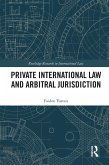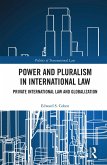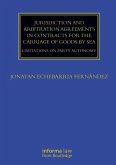Faidon Varesis
Private International Law and Arbitral Jurisdiction (eBook, PDF)
41,95 €
41,95 €
inkl. MwSt.
Sofort per Download lieferbar

21 °P sammeln
41,95 €
Als Download kaufen

41,95 €
inkl. MwSt.
Sofort per Download lieferbar

21 °P sammeln
Jetzt verschenken
Alle Infos zum eBook verschenken
41,95 €
inkl. MwSt.
Sofort per Download lieferbar
Alle Infos zum eBook verschenken

21 °P sammeln
Faidon Varesis
Private International Law and Arbitral Jurisdiction (eBook, PDF)
- Format: PDF
- Merkliste
- Auf die Merkliste
- Bewerten Bewerten
- Teilen
- Produkt teilen
- Produkterinnerung
- Produkterinnerung

Bitte loggen Sie sich zunächst in Ihr Kundenkonto ein oder registrieren Sie sich bei
bücher.de, um das eBook-Abo tolino select nutzen zu können.
Hier können Sie sich einloggen
Hier können Sie sich einloggen
Sie sind bereits eingeloggt. Klicken Sie auf 2. tolino select Abo, um fortzufahren.

Bitte loggen Sie sich zunächst in Ihr Kundenkonto ein oder registrieren Sie sich bei bücher.de, um das eBook-Abo tolino select nutzen zu können.
International commercial arbitration and litigation are often seen as competing fora, fields of law, or markets. This intersection is at its highest at the forefront of any proceedings, at the jurisdictional stage.
- Geräte: PC
- mit Kopierschutz
- eBook Hilfe
Andere Kunden interessierten sich auch für
![Private International Law and Arbitral Jurisdiction (eBook, ePUB) Private International Law and Arbitral Jurisdiction (eBook, ePUB)]() Faidon VaresisPrivate International Law and Arbitral Jurisdiction (eBook, ePUB)41,95 €
Faidon VaresisPrivate International Law and Arbitral Jurisdiction (eBook, ePUB)41,95 €![Power and Pluralism in International Law (eBook, PDF) Power and Pluralism in International Law (eBook, PDF)]() Edward S. CohenPower and Pluralism in International Law (eBook, PDF)41,95 €
Edward S. CohenPower and Pluralism in International Law (eBook, PDF)41,95 €![Private International Law in China (eBook, PDF) Private International Law in China (eBook, PDF)]() Guangjian TuPrivate International Law in China (eBook, PDF)40,95 €
Guangjian TuPrivate International Law in China (eBook, PDF)40,95 €![Jurisdiction and Arbitration Agreements in Contracts for the Carriage of Goods by Sea (eBook, PDF) Jurisdiction and Arbitration Agreements in Contracts for the Carriage of Goods by Sea (eBook, PDF)]() Jonatan Echebarria FernándezJurisdiction and Arbitration Agreements in Contracts for the Carriage of Goods by Sea (eBook, PDF)109,95 €
Jonatan Echebarria FernándezJurisdiction and Arbitration Agreements in Contracts for the Carriage of Goods by Sea (eBook, PDF)109,95 €![Adjudicating Global Business in and with India (eBook, PDF) Adjudicating Global Business in and with India (eBook, PDF)]() Adjudicating Global Business in and with India (eBook, PDF)39,95 €
Adjudicating Global Business in and with India (eBook, PDF)39,95 €![International and Interregional Enforcement of Arbitral Awards (eBook, PDF) International and Interregional Enforcement of Arbitral Awards (eBook, PDF)]() Yifei LinInternational and Interregional Enforcement of Arbitral Awards (eBook, PDF)161,95 €
Yifei LinInternational and Interregional Enforcement of Arbitral Awards (eBook, PDF)161,95 €![State Ocean Jurisdiction (eBook, PDF) State Ocean Jurisdiction (eBook, PDF)]() Patrick VranckenState Ocean Jurisdiction (eBook, PDF)0,00 €
Patrick VranckenState Ocean Jurisdiction (eBook, PDF)0,00 €-
-
-
International commercial arbitration and litigation are often seen as competing fora, fields of law, or markets. This intersection is at its highest at the forefront of any proceedings, at the jurisdictional stage.
Dieser Download kann aus rechtlichen Gründen nur mit Rechnungsadresse in A, B, BG, CY, CZ, D, DK, EW, E, FIN, F, GR, HR, H, IRL, I, LT, L, LR, M, NL, PL, P, R, S, SLO, SK ausgeliefert werden.
Produktdetails
- Produktdetails
- Verlag: Taylor & Francis eBooks
- Seitenzahl: 260
- Erscheinungstermin: 23. Dezember 2022
- Englisch
- ISBN-13: 9781000815146
- Artikelnr.: 66381484
- Verlag: Taylor & Francis eBooks
- Seitenzahl: 260
- Erscheinungstermin: 23. Dezember 2022
- Englisch
- ISBN-13: 9781000815146
- Artikelnr.: 66381484
- Herstellerkennzeichnung Die Herstellerinformationen sind derzeit nicht verfügbar.
Faidon Varesis is Teaching Fellow at National Kapodistrian University of Athens, Greece. He has completed his Ph.D. at the University of Cambridge on 'Regulation of Arbitral Jurisdiction: a Private International Law Proposal' and he has taught at Cambridge, Oxford, Milan, and Athens. His research interests focus on International Commercial Arbitration and Conflict of Laws. He holds an M.Jur. (Distinction) from the University of Oxford having already completed an LLM in Civil law (Summa cum Laude) and an LLB (Summa cum Laude) from the National and Kapodistrian University of Athens, Greece.
Aside from his academic endeavours, he is a qualified attorney practicing in international commercial and investment arbitration, as well as representing clients in international transactions.
Aside from his academic endeavours, he is a qualified attorney practicing in international commercial and investment arbitration, as well as representing clients in international transactions.
1 Introduction
1.1 Arbitral Jurisdiction in Private International Law and Arbitration
1.1.1 Jurisdiction as Adjudicatory Competence in Cross-border Disputes
1.1.2 Jurisdiction, Arbitration, and Party Autonomy
1.2 Recurring Themes
1.2.1 Arbitral Jurisdiction and Parallel Proceedings in International
Commercial Disputes
1.2.2 Private International Law Analysis of Arbitral Jurisdiction:
Comparison, Parallels, and Transposition
1.2.3 Economic Globalisation, Global Law, and Arbitral Jurisdiction
1.2.4 Jurisdictional Focus: Arbitral Jurisdiction in England and Wales
1.3 The Enquiry
1.3.1 Research Question
1.3.2 Contribution to Knowledge
1.3.3 Scope
1.3.4 Structure
2 Globalisation and Commercial Disputes
2.1 Globalisation and the Rise of Private Actors in International Commerce
2.2 State Interests in Private Commercial Disputes
2.3 Private Interests and Risks in International Commercial Transactions
and Disputes
2.4 Arbitration, Merchants, and International Commercial Disputes
2.4.1 Arbitration as a Dispute Resolution Method for Merchants
2.4.2 Arbitral Jurisdiction in the Context of International Commercial
Disputes
3 Cross-border Jurisdiction in Commercial Disputes
3.1 Jurisdictional Issues in International Commercial Disputes
3.1.1 Jurisdictional Disputes and Private International Law
3.1.2 Tactical Nature of Jurisdictional Disputes
3.1.3 Party autonomy and jurisdiction
3.2 Jurisdictional Issues in International Arbitration
3.2.1 Traditional doctrinal approach to arbitral jurisdiction
3.2.2 Jurisdictional Intersections
4 Party Autonomy in Private International Law and Arbitration
4.1 Traditional Paradigms of Private International Law and Party Autonomy
4.2 Creature of Contract or Creature of Party Autonomy?
4.3 Arbitration Agreements as an Expression of Party Autonomy in
International Commercial Arbitration
4.3.1 Common Law - Contractual Paradigm
4.3.2 Civil Law approach - Procedural Contracts
4.3.3 Dual nature and Effects of Arbitration Agreements
4.4 Arbitration, Party Autonomy, and International Commercial Dispute
Settlement
5 Existing Approaches For Regulating Arbitral Jurisdiction
5.1 Regulation of Jurisdictional Issues in International Instruments
5.1.1 New York Convention 1958
5.1.2 Parallels from the 2005 Hague Convention on Choice of Court
Agreements
5.2 Regulation of Arbitral Jurisdiction in a Comparative Context
5.2.1 New French Code of Civil Procedure-A rule of Temporal Priority
5.2.2 United States of America - Separability as a Delineating Mechanism
5.2.3 Germany-Abandoning a rule of contractual competence-competence
5.3 Theoretical Models of Regulating Arbitral Jurisdiction
5.3.1 Rau's Solar System
5.3.2 Paulsson's Presumptive Allocation of Authority
5.3.3 Reversing the Default Position
6 A global law model for arbitral jurisdiction
6.1 A Contemporary Private International Law Proposal on Arbitral
Jurisdiction: from Subordination to Synergy
6.1.1 Fitting Party Autonomy to the Traditional Paradigms or Changing the
Paradigm?
6.1.2 Arbitral jurisdiction in a Shifting Paradigm of Dispute Resolution
6.1.3 Horizontal Model of Arbitral Jurisdiction
6.2 Adopting the Proposed Model
6.2.1 Top-down adoption via multilateral treaties and model laws
6.2.2 Arbitral Jurisdiction and State Regulatory Competition
6.2.3 Private Regulation and Arbitral Jurisdiction
6.2.4 Horizontal Choice and English Commercial Arbitration and Litigation
7 Arbitral jurisdiction from a state court's perspective
7.1 Stay of Proceedings
7.1.1 Stay of Proceedings under Section 9 Arbitration Act 1996
7.1.2 Inherent/Case Management Stays
7.1.3 Restated Approach
7.2 Declarations of Validity: Cost Management Tools or Jurisdictional
Encroachment?
7.2.1 Declaration under Section 32 of the Arbitration Act 1996
7.2.2 Powers under Section 72 of the Arbitration Act 1996
7.2.3 Restated Approach
7.3 Enforcement of Arbitration Agreements: Traditional and Equitable
Remedies
7.3.1 Court-Ordered Anti-Suit Injunctions
7.3.2 Specific Performance Order: the Positive Obligation
7.3.3 Restated Approach
7.4 Enforcement of Arbitration Agreements: Damages
7.4.1 Damages in the Law and Practice of England and Wales
7.4.2 Restated Approach
7.5 Post-award Intersections: Jurisdictional Review and Control
7.5.1 Grounds and Standard of Review
7.5.2 Conflict of Judgments
8 Arbitral Jurisdiction: Issues Before Arbitral Tribunals
8.1 Competence to Decide Jurisdictional Issues Redux
8.2 Stay of Arbitration Proceedings
8.3 Enforcing the Arbitration Agreement: Arbitral Enforcement Orders
8.3.1 Jurisdiction to Grant Arbitral Enforcement Orders
8.3.2 Enforcement
8.3.3 Restated Approach
8.4 Monetary Sanctions and Damages as Tools Bolstering Arbitral Enforcement
Orders
8.4.1 Monetary Sanctions
8.4.2 Enforcing the Arbitration Agreement with a Damages Award
8.5 Contractual Undertakings
9 Conclusions: Arbitral Jurisdiction Architecture
1.1 Arbitral Jurisdiction in Private International Law and Arbitration
1.1.1 Jurisdiction as Adjudicatory Competence in Cross-border Disputes
1.1.2 Jurisdiction, Arbitration, and Party Autonomy
1.2 Recurring Themes
1.2.1 Arbitral Jurisdiction and Parallel Proceedings in International
Commercial Disputes
1.2.2 Private International Law Analysis of Arbitral Jurisdiction:
Comparison, Parallels, and Transposition
1.2.3 Economic Globalisation, Global Law, and Arbitral Jurisdiction
1.2.4 Jurisdictional Focus: Arbitral Jurisdiction in England and Wales
1.3 The Enquiry
1.3.1 Research Question
1.3.2 Contribution to Knowledge
1.3.3 Scope
1.3.4 Structure
2 Globalisation and Commercial Disputes
2.1 Globalisation and the Rise of Private Actors in International Commerce
2.2 State Interests in Private Commercial Disputes
2.3 Private Interests and Risks in International Commercial Transactions
and Disputes
2.4 Arbitration, Merchants, and International Commercial Disputes
2.4.1 Arbitration as a Dispute Resolution Method for Merchants
2.4.2 Arbitral Jurisdiction in the Context of International Commercial
Disputes
3 Cross-border Jurisdiction in Commercial Disputes
3.1 Jurisdictional Issues in International Commercial Disputes
3.1.1 Jurisdictional Disputes and Private International Law
3.1.2 Tactical Nature of Jurisdictional Disputes
3.1.3 Party autonomy and jurisdiction
3.2 Jurisdictional Issues in International Arbitration
3.2.1 Traditional doctrinal approach to arbitral jurisdiction
3.2.2 Jurisdictional Intersections
4 Party Autonomy in Private International Law and Arbitration
4.1 Traditional Paradigms of Private International Law and Party Autonomy
4.2 Creature of Contract or Creature of Party Autonomy?
4.3 Arbitration Agreements as an Expression of Party Autonomy in
International Commercial Arbitration
4.3.1 Common Law - Contractual Paradigm
4.3.2 Civil Law approach - Procedural Contracts
4.3.3 Dual nature and Effects of Arbitration Agreements
4.4 Arbitration, Party Autonomy, and International Commercial Dispute
Settlement
5 Existing Approaches For Regulating Arbitral Jurisdiction
5.1 Regulation of Jurisdictional Issues in International Instruments
5.1.1 New York Convention 1958
5.1.2 Parallels from the 2005 Hague Convention on Choice of Court
Agreements
5.2 Regulation of Arbitral Jurisdiction in a Comparative Context
5.2.1 New French Code of Civil Procedure-A rule of Temporal Priority
5.2.2 United States of America - Separability as a Delineating Mechanism
5.2.3 Germany-Abandoning a rule of contractual competence-competence
5.3 Theoretical Models of Regulating Arbitral Jurisdiction
5.3.1 Rau's Solar System
5.3.2 Paulsson's Presumptive Allocation of Authority
5.3.3 Reversing the Default Position
6 A global law model for arbitral jurisdiction
6.1 A Contemporary Private International Law Proposal on Arbitral
Jurisdiction: from Subordination to Synergy
6.1.1 Fitting Party Autonomy to the Traditional Paradigms or Changing the
Paradigm?
6.1.2 Arbitral jurisdiction in a Shifting Paradigm of Dispute Resolution
6.1.3 Horizontal Model of Arbitral Jurisdiction
6.2 Adopting the Proposed Model
6.2.1 Top-down adoption via multilateral treaties and model laws
6.2.2 Arbitral Jurisdiction and State Regulatory Competition
6.2.3 Private Regulation and Arbitral Jurisdiction
6.2.4 Horizontal Choice and English Commercial Arbitration and Litigation
7 Arbitral jurisdiction from a state court's perspective
7.1 Stay of Proceedings
7.1.1 Stay of Proceedings under Section 9 Arbitration Act 1996
7.1.2 Inherent/Case Management Stays
7.1.3 Restated Approach
7.2 Declarations of Validity: Cost Management Tools or Jurisdictional
Encroachment?
7.2.1 Declaration under Section 32 of the Arbitration Act 1996
7.2.2 Powers under Section 72 of the Arbitration Act 1996
7.2.3 Restated Approach
7.3 Enforcement of Arbitration Agreements: Traditional and Equitable
Remedies
7.3.1 Court-Ordered Anti-Suit Injunctions
7.3.2 Specific Performance Order: the Positive Obligation
7.3.3 Restated Approach
7.4 Enforcement of Arbitration Agreements: Damages
7.4.1 Damages in the Law and Practice of England and Wales
7.4.2 Restated Approach
7.5 Post-award Intersections: Jurisdictional Review and Control
7.5.1 Grounds and Standard of Review
7.5.2 Conflict of Judgments
8 Arbitral Jurisdiction: Issues Before Arbitral Tribunals
8.1 Competence to Decide Jurisdictional Issues Redux
8.2 Stay of Arbitration Proceedings
8.3 Enforcing the Arbitration Agreement: Arbitral Enforcement Orders
8.3.1 Jurisdiction to Grant Arbitral Enforcement Orders
8.3.2 Enforcement
8.3.3 Restated Approach
8.4 Monetary Sanctions and Damages as Tools Bolstering Arbitral Enforcement
Orders
8.4.1 Monetary Sanctions
8.4.2 Enforcing the Arbitration Agreement with a Damages Award
8.5 Contractual Undertakings
9 Conclusions: Arbitral Jurisdiction Architecture
1 Introduction
1.1 Arbitral Jurisdiction in Private International Law and Arbitration
1.1.1 Jurisdiction as Adjudicatory Competence in Cross-border Disputes
1.1.2 Jurisdiction, Arbitration, and Party Autonomy
1.2 Recurring Themes
1.2.1 Arbitral Jurisdiction and Parallel Proceedings in International
Commercial Disputes
1.2.2 Private International Law Analysis of Arbitral Jurisdiction:
Comparison, Parallels, and Transposition
1.2.3 Economic Globalisation, Global Law, and Arbitral Jurisdiction
1.2.4 Jurisdictional Focus: Arbitral Jurisdiction in England and Wales
1.3 The Enquiry
1.3.1 Research Question
1.3.2 Contribution to Knowledge
1.3.3 Scope
1.3.4 Structure
2 Globalisation and Commercial Disputes
2.1 Globalisation and the Rise of Private Actors in International Commerce
2.2 State Interests in Private Commercial Disputes
2.3 Private Interests and Risks in International Commercial Transactions
and Disputes
2.4 Arbitration, Merchants, and International Commercial Disputes
2.4.1 Arbitration as a Dispute Resolution Method for Merchants
2.4.2 Arbitral Jurisdiction in the Context of International Commercial
Disputes
3 Cross-border Jurisdiction in Commercial Disputes
3.1 Jurisdictional Issues in International Commercial Disputes
3.1.1 Jurisdictional Disputes and Private International Law
3.1.2 Tactical Nature of Jurisdictional Disputes
3.1.3 Party autonomy and jurisdiction
3.2 Jurisdictional Issues in International Arbitration
3.2.1 Traditional doctrinal approach to arbitral jurisdiction
3.2.2 Jurisdictional Intersections
4 Party Autonomy in Private International Law and Arbitration
4.1 Traditional Paradigms of Private International Law and Party Autonomy
4.2 Creature of Contract or Creature of Party Autonomy?
4.3 Arbitration Agreements as an Expression of Party Autonomy in
International Commercial Arbitration
4.3.1 Common Law - Contractual Paradigm
4.3.2 Civil Law approach - Procedural Contracts
4.3.3 Dual nature and Effects of Arbitration Agreements
4.4 Arbitration, Party Autonomy, and International Commercial Dispute
Settlement
5 Existing Approaches For Regulating Arbitral Jurisdiction
5.1 Regulation of Jurisdictional Issues in International Instruments
5.1.1 New York Convention 1958
5.1.2 Parallels from the 2005 Hague Convention on Choice of Court
Agreements
5.2 Regulation of Arbitral Jurisdiction in a Comparative Context
5.2.1 New French Code of Civil Procedure-A rule of Temporal Priority
5.2.2 United States of America - Separability as a Delineating Mechanism
5.2.3 Germany-Abandoning a rule of contractual competence-competence
5.3 Theoretical Models of Regulating Arbitral Jurisdiction
5.3.1 Rau's Solar System
5.3.2 Paulsson's Presumptive Allocation of Authority
5.3.3 Reversing the Default Position
6 A global law model for arbitral jurisdiction
6.1 A Contemporary Private International Law Proposal on Arbitral
Jurisdiction: from Subordination to Synergy
6.1.1 Fitting Party Autonomy to the Traditional Paradigms or Changing the
Paradigm?
6.1.2 Arbitral jurisdiction in a Shifting Paradigm of Dispute Resolution
6.1.3 Horizontal Model of Arbitral Jurisdiction
6.2 Adopting the Proposed Model
6.2.1 Top-down adoption via multilateral treaties and model laws
6.2.2 Arbitral Jurisdiction and State Regulatory Competition
6.2.3 Private Regulation and Arbitral Jurisdiction
6.2.4 Horizontal Choice and English Commercial Arbitration and Litigation
7 Arbitral jurisdiction from a state court's perspective
7.1 Stay of Proceedings
7.1.1 Stay of Proceedings under Section 9 Arbitration Act 1996
7.1.2 Inherent/Case Management Stays
7.1.3 Restated Approach
7.2 Declarations of Validity: Cost Management Tools or Jurisdictional
Encroachment?
7.2.1 Declaration under Section 32 of the Arbitration Act 1996
7.2.2 Powers under Section 72 of the Arbitration Act 1996
7.2.3 Restated Approach
7.3 Enforcement of Arbitration Agreements: Traditional and Equitable
Remedies
7.3.1 Court-Ordered Anti-Suit Injunctions
7.3.2 Specific Performance Order: the Positive Obligation
7.3.3 Restated Approach
7.4 Enforcement of Arbitration Agreements: Damages
7.4.1 Damages in the Law and Practice of England and Wales
7.4.2 Restated Approach
7.5 Post-award Intersections: Jurisdictional Review and Control
7.5.1 Grounds and Standard of Review
7.5.2 Conflict of Judgments
8 Arbitral Jurisdiction: Issues Before Arbitral Tribunals
8.1 Competence to Decide Jurisdictional Issues Redux
8.2 Stay of Arbitration Proceedings
8.3 Enforcing the Arbitration Agreement: Arbitral Enforcement Orders
8.3.1 Jurisdiction to Grant Arbitral Enforcement Orders
8.3.2 Enforcement
8.3.3 Restated Approach
8.4 Monetary Sanctions and Damages as Tools Bolstering Arbitral Enforcement
Orders
8.4.1 Monetary Sanctions
8.4.2 Enforcing the Arbitration Agreement with a Damages Award
8.5 Contractual Undertakings
9 Conclusions: Arbitral Jurisdiction Architecture
1.1 Arbitral Jurisdiction in Private International Law and Arbitration
1.1.1 Jurisdiction as Adjudicatory Competence in Cross-border Disputes
1.1.2 Jurisdiction, Arbitration, and Party Autonomy
1.2 Recurring Themes
1.2.1 Arbitral Jurisdiction and Parallel Proceedings in International
Commercial Disputes
1.2.2 Private International Law Analysis of Arbitral Jurisdiction:
Comparison, Parallels, and Transposition
1.2.3 Economic Globalisation, Global Law, and Arbitral Jurisdiction
1.2.4 Jurisdictional Focus: Arbitral Jurisdiction in England and Wales
1.3 The Enquiry
1.3.1 Research Question
1.3.2 Contribution to Knowledge
1.3.3 Scope
1.3.4 Structure
2 Globalisation and Commercial Disputes
2.1 Globalisation and the Rise of Private Actors in International Commerce
2.2 State Interests in Private Commercial Disputes
2.3 Private Interests and Risks in International Commercial Transactions
and Disputes
2.4 Arbitration, Merchants, and International Commercial Disputes
2.4.1 Arbitration as a Dispute Resolution Method for Merchants
2.4.2 Arbitral Jurisdiction in the Context of International Commercial
Disputes
3 Cross-border Jurisdiction in Commercial Disputes
3.1 Jurisdictional Issues in International Commercial Disputes
3.1.1 Jurisdictional Disputes and Private International Law
3.1.2 Tactical Nature of Jurisdictional Disputes
3.1.3 Party autonomy and jurisdiction
3.2 Jurisdictional Issues in International Arbitration
3.2.1 Traditional doctrinal approach to arbitral jurisdiction
3.2.2 Jurisdictional Intersections
4 Party Autonomy in Private International Law and Arbitration
4.1 Traditional Paradigms of Private International Law and Party Autonomy
4.2 Creature of Contract or Creature of Party Autonomy?
4.3 Arbitration Agreements as an Expression of Party Autonomy in
International Commercial Arbitration
4.3.1 Common Law - Contractual Paradigm
4.3.2 Civil Law approach - Procedural Contracts
4.3.3 Dual nature and Effects of Arbitration Agreements
4.4 Arbitration, Party Autonomy, and International Commercial Dispute
Settlement
5 Existing Approaches For Regulating Arbitral Jurisdiction
5.1 Regulation of Jurisdictional Issues in International Instruments
5.1.1 New York Convention 1958
5.1.2 Parallels from the 2005 Hague Convention on Choice of Court
Agreements
5.2 Regulation of Arbitral Jurisdiction in a Comparative Context
5.2.1 New French Code of Civil Procedure-A rule of Temporal Priority
5.2.2 United States of America - Separability as a Delineating Mechanism
5.2.3 Germany-Abandoning a rule of contractual competence-competence
5.3 Theoretical Models of Regulating Arbitral Jurisdiction
5.3.1 Rau's Solar System
5.3.2 Paulsson's Presumptive Allocation of Authority
5.3.3 Reversing the Default Position
6 A global law model for arbitral jurisdiction
6.1 A Contemporary Private International Law Proposal on Arbitral
Jurisdiction: from Subordination to Synergy
6.1.1 Fitting Party Autonomy to the Traditional Paradigms or Changing the
Paradigm?
6.1.2 Arbitral jurisdiction in a Shifting Paradigm of Dispute Resolution
6.1.3 Horizontal Model of Arbitral Jurisdiction
6.2 Adopting the Proposed Model
6.2.1 Top-down adoption via multilateral treaties and model laws
6.2.2 Arbitral Jurisdiction and State Regulatory Competition
6.2.3 Private Regulation and Arbitral Jurisdiction
6.2.4 Horizontal Choice and English Commercial Arbitration and Litigation
7 Arbitral jurisdiction from a state court's perspective
7.1 Stay of Proceedings
7.1.1 Stay of Proceedings under Section 9 Arbitration Act 1996
7.1.2 Inherent/Case Management Stays
7.1.3 Restated Approach
7.2 Declarations of Validity: Cost Management Tools or Jurisdictional
Encroachment?
7.2.1 Declaration under Section 32 of the Arbitration Act 1996
7.2.2 Powers under Section 72 of the Arbitration Act 1996
7.2.3 Restated Approach
7.3 Enforcement of Arbitration Agreements: Traditional and Equitable
Remedies
7.3.1 Court-Ordered Anti-Suit Injunctions
7.3.2 Specific Performance Order: the Positive Obligation
7.3.3 Restated Approach
7.4 Enforcement of Arbitration Agreements: Damages
7.4.1 Damages in the Law and Practice of England and Wales
7.4.2 Restated Approach
7.5 Post-award Intersections: Jurisdictional Review and Control
7.5.1 Grounds and Standard of Review
7.5.2 Conflict of Judgments
8 Arbitral Jurisdiction: Issues Before Arbitral Tribunals
8.1 Competence to Decide Jurisdictional Issues Redux
8.2 Stay of Arbitration Proceedings
8.3 Enforcing the Arbitration Agreement: Arbitral Enforcement Orders
8.3.1 Jurisdiction to Grant Arbitral Enforcement Orders
8.3.2 Enforcement
8.3.3 Restated Approach
8.4 Monetary Sanctions and Damages as Tools Bolstering Arbitral Enforcement
Orders
8.4.1 Monetary Sanctions
8.4.2 Enforcing the Arbitration Agreement with a Damages Award
8.5 Contractual Undertakings
9 Conclusions: Arbitral Jurisdiction Architecture







